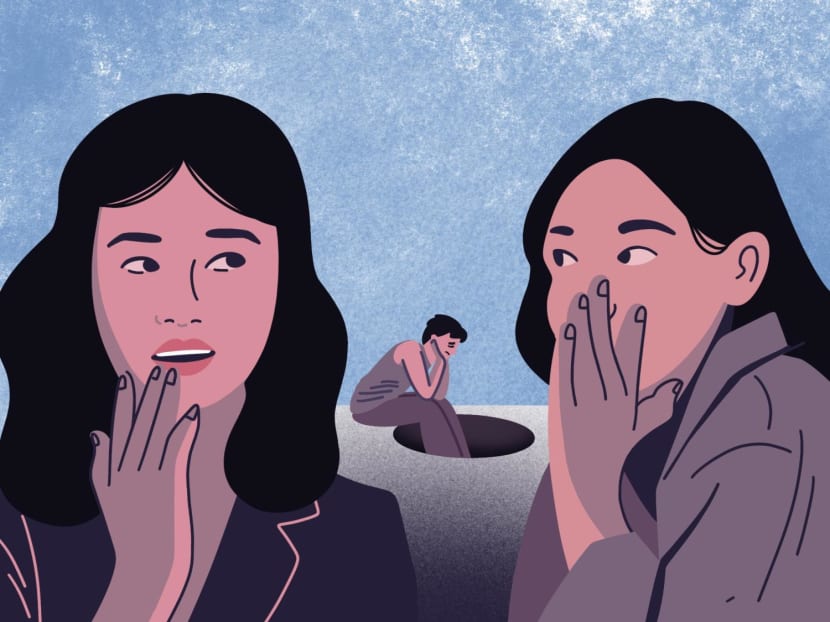'Not always about mental illness': Discussions about suicide among youth are too simplified and secretive, helpline volunteers say

(Illustration: CNA/Nurjannah Suhaimi)
Warning: This article discusses suicide.
SINGAPORE — When Mr Reshii Varma lost a loved one to suicide several years ago, he found that it was hard to talk about suicide with people around him without it being seen as a form of mental illness.
The 24-year-old manager at social enterprise Hush TeaBar told TODAY that because suicide is often conflated with mental disorders or oversimplified to a single root cause, this "misconception" makes it difficult for those experiencing suicidal ideation to seek support from people around them.
Suicidal ideation is having thoughts of self-harm or ending one's life and it is something that Mr Reshii said he has experienced personally as well.
“People often assume that if you’re suicidal, you must have a clinical condition like depression, but it’s not always that straightforward," he added.
“Suicide is rarely about just one issue — it’s usually a mix of factors that come together and understanding that complexity is essential for better support.”
After all, anyone can go through external pressures that can feel overwhelming such as emotional burnout and job stress, he said.
Hush TeaBar, the social enterprise he manages, helps to create environments where people may openly reflect and share their experiences without fear of judgement.
Although suicide rates in Singapore have reached their lowest in 20 years, helpline volunteers as well as those who had lived experience with suicide told TODAY that discussions surrounding suicide remain somewhat secretive and that people would use “hushed tones” to approach the topic.
In July, the Samaritans of Singapore (SOS) reported a total of 322 suicides in Singapore for 2023. This was a 32.4 per cent decrease from 2022, with a drop across all age groups for the first time, SOS said.
Ahead of World Suicide Prevention Day on Sept 10, TODAY spoke with volunteers who man helplines to understand why there is still more to be done in the way society supports people who need help.
This is even though callers nowadays tend to be better able to articulate their emotions and thoughts about what they are going through, the volunteers observed.
Ms Leow Wei Ru believes that this is because young people have ready access to mental health information online, which could also downplay their internal conflicts.
She is a volunteer in her 30s with Youthline, a helpline dedicated to callers up to the age of 35, and she has manned the helplines for more than a year.
“On the one hand, (this) has helped some people become more open to talking about their struggles and emotions, but on the other hand, some can end up seeing what they face as too 'insignificant' to talk about.”
When it comes to mental health, "there's nothing too small to talk about", she added.
STRESSORS COME FROM MANY PLACES
The reality is that callers often reach out to someone via helplines for various reasons related to relationships, work stressors, parental issues and other social problems.
It does not necessarily mean that they have a mental disorder.
For example, Ms Vida Ortiz, counsellor and psychotherapist at Promises Healthcare, noted how men often face societal pressure to conform to traditional notions of masculinity, discouraging them from expressing vulnerability or seeking help for mental health issues.
For women juggling multiple roles such as career responsibilities, caregiving and maintaining family relationships, these overlapping demands can contribute to stress and anxiety, which can put them at risk of suicide, she added.
Agreeing, a 49-year-old volunteer at SOS, who wanted to be known only as Tessa, said: “What is apparent is that the stressors are complex and overwhelming, leading to an inability to cope.”
She noted that people needing support are getting younger and also come from smaller families, which means that during times of personal crisis, they have a smaller social support network than in the past.
She recalled a recent encounter with a caller aged between 10 and 12 who had just lost his mother. His father was away on a business trip, the boy had no siblings and was alone at home with the family's domestic worker.
“These days, parents are calling in with their suicidal children sitting beside them, asking what they should do to support their children,” Tessa added.
Mr Francis Dorai, 62, a volunteer with Youthline, said that although things have not changed in that young people have to cope with studies, manage relationships and deal with parents, today’s environment is much more “formidable” than it once was.
He explained that an increasingly toxic social media space has exacerbated and amplified these common growing pains and has created a "minefield" for people to navigate complex matters such as academic stress and personal relationships.
Ms Leow the other Youthline volunteer observed that academic pressures do drive some young people to their “breaking point”.
“They're becoming more indifferent about their studies. For some, it's like, 'So what, even if I score well or not, does it matter?’”
Parliament addressed the causal links between academic stress and suicides last month, with Education Minister Chan Chun Sing stating that for students whose mental health have taken a hit, it is not typically caused by academic stress alone, but "compounded by other factors such as low self-esteem, relationship issues with parents and peers, or challenging life circumstances".
Responding to a question by Nominated Member of Parliament Razwana Begum Abdul Rahim, Mr Chan said that academic stress can also be driven by unrealistic expectations of academic performance that stem from self and others or the desire to outperform others.
"If such stresses become excessive and are left unmanaged, they can adversely affect the students’ mental well-being," Mr Chan added.
STILL TRICKY TO DISCUSS SUICIDE WITH FAMILY, FRIENDS
Mr Low Tze Theng, a staff member who has worked at Silver Ribbon for 12 years, noted that as callers get younger, these young persons are also more capable in expressing their thoughts to helpline volunteers, which aids the non-profit organisation to better address callers' needs.
Silver Ribbon promotes mental health awareness and seeks to combat the stigma surrounding mental illness in Singapore.
Tessa, the SOS volunteer, said that such self-awareness among the young is a positive sign and they should also be able to navigate these emotions “either within themselves or by tapping available resources”.
Yet many still shy away from speaking about suicide openly with people around them, even within families where suicide had taken place, the volunteers said.
“Well-meaning family members and friends encourage them to 'get over it quickly' by not dwelling on it and moving on,” Tessa added.
She also said that many people seem to view suicide as a very heavy and serious topic, something to be spoken about in “hushed tones”, and they feel that they are ill-equipped to provide any form of assistance.
“However, grief and bereavement are complex and require a long time to process and address.
"This denial causes more isolation and puts them at higher risk of other downstream difficulties like trauma or even suicide,” Tessa said.
To help people be more open, Mr Reshii from Hush TeaBar would often conduct corporate workshops with his deaf teammates to create inclusive and empathetic workplaces.
He has also lent his story to Project Hayat ("life" in Malay), a community-led collective effort to develop a white paper for a national suicide prevention strategy.
The project by SG Mental Health Matters is set to launch a white paper outlining key recommendations for a national strategy for suicide prevention on Sept 10.
It is spearheaded by:
- Former Nominated Member of Parliament Anthea Ong
- Dr Jared Ng, psychiatrist and medical director at Connections MindHealth
- Assistant Professor Rayner Tan from the Saw Swee Hock School of Public Health at the National University of Singapore
Asst Prof Tan said that there is a confluence of research to show that national suicide prevention strategies are effective in reducing suicide rates, and there is also a strong desire by societal partners to prevent suicide.
Dr Ng said: "Project Hayat marks just the beginning of what must be a sustained, collective effort. My hope is for a future where no one feels isolated in their suffering or distress and where every person can access the support they need long before reaching a breaking point.
“Suicide prevention goes far beyond mental health services — it requires the engagement of our entire society.”
As for Mr Reshii, he said that there is still a need to create judgement-free spaces where people feel safe to talk about their experiences.
“After speaking at Hush TeaBar, people have come up to me to say that my story resonated with them because they or someone close to them was going through something similar,” he said.
"It’s fulfilling to know that... I’ve helped others feel less alone and more understood," he said.
WHERE TO GET HELP
- Samaritans of Singapore Hotline: 1767
- Institute of Mental Health’s Helpline: 6389 2222
- Singapore Association for Mental Health Helpline: 1800 283 7019
You may also find a list of international helplines here. If someone you know is at immediate risk, call 24-hour emergency medical services.








